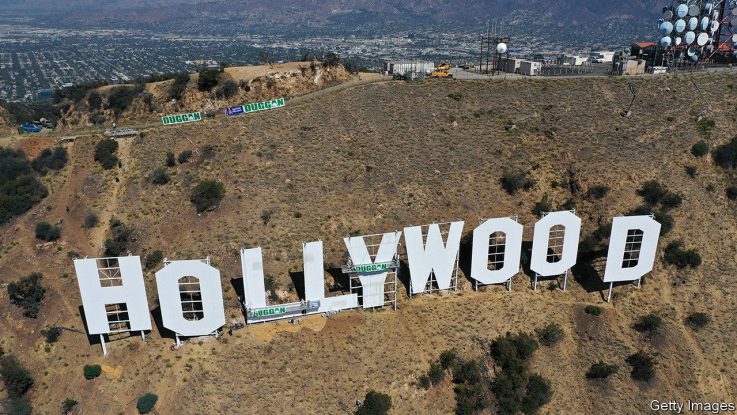
ONE HUNDRED years ago, the hills above Los Angeles got a facelift. A giant sign was erected to advertise a new real-estate development. Its 13 letters, each 43 feet tall, spelled “HOLLYWOODLAND” (“land” was later dropped). The modern movie business was forming around the same time as Warner Brothers consolidated power and Walt Disney left Kansas City for Los Angeles. Yet instead of celebrating its centenary, Hollywood is preparing for upheaval: screenwriters are poised to strike for the first time in 15 years.
Every three years the Alliance of Motion Picture and Television Producers, the trade group for the studios, negotiates a new contract with the Writers Guild of America (WGA), the writers’ union. This year negotiations look to be headed towards a cliff as studios and writers grapple with the ways in which streaming has upended their business models and working conditions, respectively. Some 9,000 WGA members, nearly 98% of those who voted, opted to strike should their contract expire on May 1st without a deal.
The writers’ complaints boil down to two big issues. First is the amount of work on offer. There were nearly 600 original scripted television shows in 2022, more than ever before. But in the age of streaming, more content does not necessarily mean more work. Many writers’ rooms—where scribes try to wrangle ideas into scripts—last for fewer weeks and employ fewer writers than in the past. Inspiring particular ire are “mini rooms”, where a few writers map out several episodes before a show even gets the green light. “I do think it’s a cost-cutting measure, it certainly is cheaper,” says Sean Collins-Smith, a writer on NBC’s cop drama “Chicago PD”.
The second problem lies with “residuals”, which is what a writer gets paid each time an episode or film they worked on is rebroadcast. In the Netflix era, films and TV shows can be rebroadcast on demand. Writers argue that the industry has not yet found a way to equitably adjust their payment system to account for this gargantuan change.
The effect of a writers’ strike would be felt across Hollywood. When shows stop production, camera people, lighting operators and costume designers are also out of work. The businesses surrounding the studios suffer. Late-night talk shows would be the first to go dark. The Milken Institute, a think-tank in Santa Monica, reckons the previous writers’ strike in 2007 and 2008 cost California’s economy $2.1bn. A work stoppage could also set a precedent for studios’ coming negotiations with the directors’ and actors’ unions.
Striking Hollywood writers may inspire less national sympathy than factory workers who down tools, or even the cash-strapped graduate students who went on strike across California last year. “I do think there’s a notion out there of the spoiled, entitled, glitz and glam lifestyle of Hollywood writers,” admits Mr Collins-Smith. But “I know people who, when they got out of their last room, immediately started driving for Uber.”
That is entirely possible. Los Angeles is the fourth-most-expensive city in the world, according to an annual cost-of-living survey from EIU, The Economist’s sister company. “You come to LA for the land of opportunity,” says Jake Lawler, a 24-year-old writer who moonlights as a stuntman to make ends meet. “But the peace-of-mind tax is way higher than anywhere else in the country.”
For the studios, the spectre hovering over contract negotiations is whether the film industry can make money. Before covid-19 shuttered cinemas, theatrical releases accounted for about 45% of a studio’s revenues for a big-budget film, according to an analysis from FTI Consulting. Americans are again going to the movies, but not in pre-pandemic numbers. The streamers are also hunting for profits. Netflix announced hundreds of lay-offs in 2022 after it lost subscribers for the first time since 2011, and the company recently said it would restructure its film department to focus on fewer, better flicks. “There’s going to be a precipitous drop in investments in movies in general, because it’s just hard to make a profit,” warns Howard Suber, who taught film at the University of California, Los Angeles for 45 years.
In some ways, the looming strike and business-model woes are what Hollywood is accustomed to. “Every five to ten years there’s some kind of crisis, going back to the introduction of sound,” says Mr Suber with a chuckle. Hollywood is celebrating its century the only way it knows how: chaotically. ■



